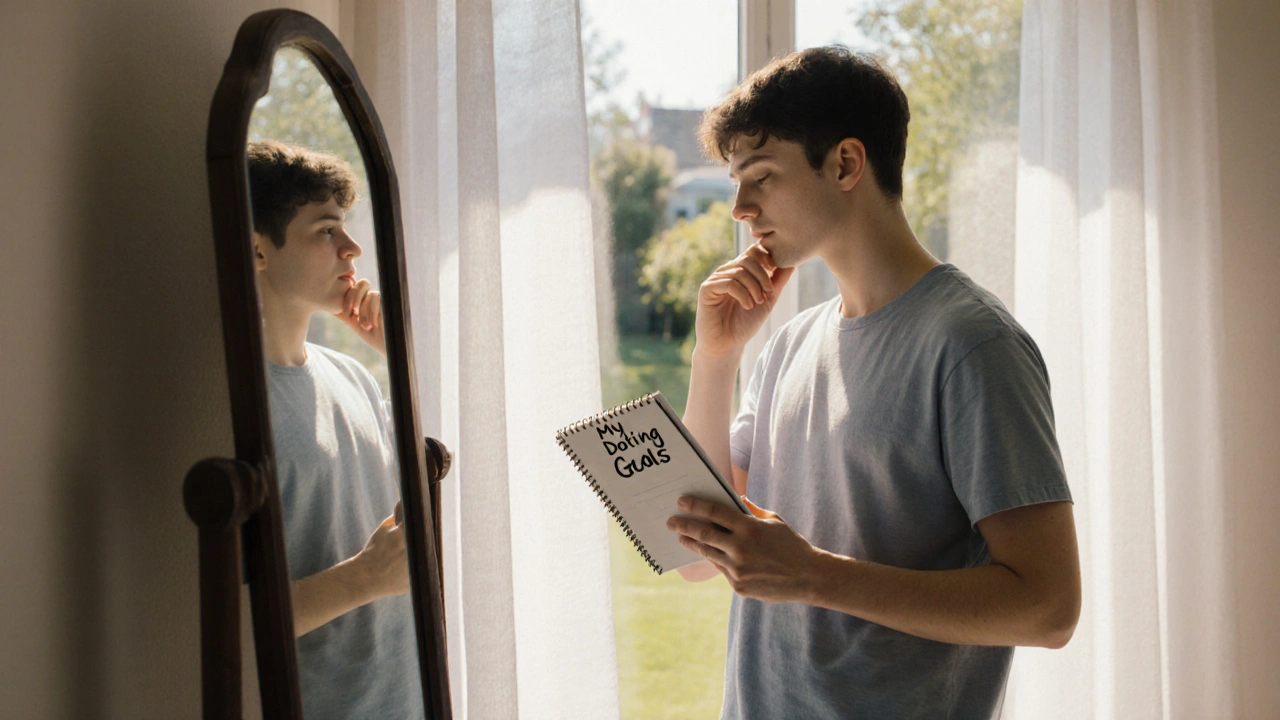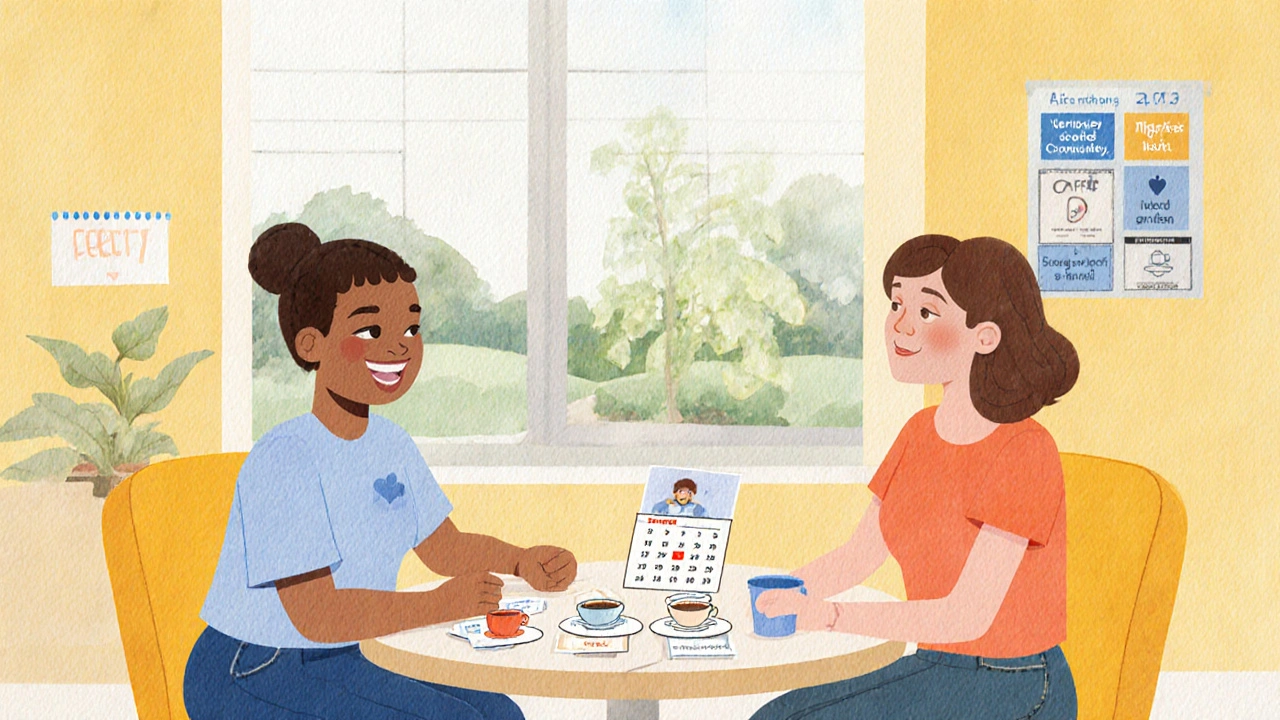Intellectual Disabilities and Dating: Practical Guide to Romantic Relationships
 Oct, 10 2025
Oct, 10 2025
Dating Options Comparison Tool
Offline Dating
Community-based approaches offer real-time interaction and supervised environments.
- Free or low-cost community events
- Supervised settings with staff present
- Real-time social skills practice
- Local geographic reach
- Good for those who enjoy group activities
Online Dating
Digital platforms provide structured communication and accessibility features.
- Free-to-use apps with optional premium features
- Profile verification and reporting systems
- Text-based communication for practice
- Regional or national geographic reach
- Best for tech-savvy individuals
Comparison Table
| Aspect | Offline (Community-Based) | Online (Specialized Apps) |
|---|---|---|
| Typical Cost | Low – often free community events | Free-to-use apps; premium features $5-$10 per month |
| Safety Controls | Supervised settings, staff present | Profile verification, in-app reporting |
| Social Skills Practice | Real-time interaction, body language cues | Text-based, can rehearse messages |
| Geographic Reach | Local only | Regional or national, depending on app |
| Best For | Those who enjoy group activities, need hands-on support | Tech-savvy individuals comfortable with digital communication |
Recommendation Based on Your Preferences
Select your preferences below to get personalized recommendations.
Quick Takeaways
- Know your rights: people with intellectual disabilities have the same legal right to date as anyone else.
- Start with self‑awareness: understand your strengths, boundaries and what you’re looking for.
- Practice clear communication-both spoken and non‑verbal.
- Consent is non‑negotiable; always check in and respect signals.
- Use a mix of offline activities and safe online platforms; compare options in the table below.
Intellectual Disabilities and Dating is a topic that explores how people with cognitive challenges experience romance, build relationships, and navigate the unique hurdles that can arise in modern dating scenes. While the term can sound clinical, the reality is simple: love, attraction and companionship are human needs, no matter the brain profile.
Understanding Intellectual Disability and Romance
Intellectual disability is a developmental condition characterized by below‑average intellectual functioning and adaptive behavior challenges that appear before adulthood. According to the World Health Organization, about 1-3% of the global population lives with some form of intellectual disability.
When you add dating into the mix, you’re looking at a set of social, emotional and practical skills that many people develop through trial, error and mentorship. For someone with an intellectual disability, these skills might need more explicit teaching, repetition and a supportive environment.
Key takeaway: intellectual disability does not erase desire for romance, but it does mean the learning curve can be steeper. Recognizing that helps you (or your loved one) set realistic expectations and celebrate progress early.
Building Self‑Awareness & Confidence
Before stepping into the dating world, spend time on self‑knowledge. Ask yourself:
- What do I enjoy doing in free time?
- What are my strengths-listening, humor, creativity?
- Which situations make me feel nervous, and how can I prepare for them?
Tools like self‑advocacy workshops or community‑led confidence‑building groups give concrete practice. In Auckland, for example, the Autism & Developmental Disabilities Support Centre runs weekly role‑play sessions that simulate first‑date scenarios.
Documenting successes-like a friendly chat with a neighbour-creates a confidence log you can revisit when doubt creeps in.

Communication Skills for Dating
Clear communication is the backbone of any relationship. With intellectual disabilities, the following strategies work well:
- Use simple, concrete language. Instead of “Let’s hang out sometime,” say “Would you like to meet for coffee at 3pm on Saturday?”
- Practice active listening: repeat back what the other person said to confirm understanding.
- Utilize visual aids. A calendar, picture cards or a phone reminder can help track dates and plans.
- Role‑play common scenarios with a trusted friend or support worker to build muscle memory.
When both parties speak in straightforward terms, misunderstandings drop dramatically. Studies from the University of Canterbury (2023) showed that couples who used visual schedules reported 42% higher satisfaction after six months.
Consent and Safety
Consent is a universal rule, but the way it’s expressed can vary. For someone with an intellectual disability, it’s crucial to:
- Ask clear yes/no questions. "Do you want to hold hands?" is better than "Are you comfortable?"
- Look for non‑verbal cues-smiling, leaning in, or pulling away-and treat a hesitant body language as a "no."
- Set personal boundaries in advance. Write them down and review before a date.
- Have a safety plan: a trusted contact you can call, a pre‑arranged check‑in time, and a clear exit strategy.
Legal guardians often wonder about consent laws. In NewZealand, the Mental Health (Compulsory) Care and Treatment Act (1992) does not restrict adults with intellectual disabilities from consenting to relationships, as long as they have the capacity to understand the nature of the decision. When capacity is uncertain, a professional assessment can clarify.
Finding Partners: Offline & Online Options
There’s no one‑size‑fits‑all approach. Some people thrive in community events; others prefer the structured world of online apps designed for neurodiverse users. Below is a quick comparison.
| Aspect | Offline (Community‑Based) | Online (Specialized Apps) |
|---|---|---|
| Typical Cost | Low - often free community events | Free‑to‑use apps; premium features $5‑$10 per month |
| Safety Controls | Supervised settings, staff present | Profile verification, in‑app reporting |
| Social Skills Practice | Real‑time interaction, body language cues | Text‑based, can rehearse messages |
| Geographic Reach | Local only | Regional or national, depending on app |
| Best For | Those who enjoy group activities, need hands‑on support | Tech‑savvy individuals comfortable with digital communication |
Popular specialized platforms in 2025 include NeuroMatch, which offers guided profile creation and a “buddy‑check” feature where a trusted friend can monitor conversations.

Support Networks and Guardianship
Having a reliable support network makes the dating journey smoother. This can include:
- Family members who act as mentors.
- Professional support workers trained in relationship education.
- Peer groups from local disability organizations.
- Legal advisors familiar with guardianship policies.
If a legal guardian is involved, open communication about goals helps avoid conflict. Explain that dating does not equal “risky behavior”; rather, it’s a step toward independence and emotional growth.
Managing Expectations and Emotional Well‑Being
Romantic relationships can bring joy, but also disappointment. For individuals with intellectual disabilities, coping mechanisms are essential:
- Set realistic milestones. A first coffee meet‑up is a win; a long‑term partnership is a future possibility.
- Practice emotional regulation techniques-deep breathing, counting to ten, or using a calm‑down card.
- Keep a journal of feelings after each date. Highlight what felt good and what felt uncomfortable.
- Reach out to your support network if you feel overwhelmed. They can help reframe negative thoughts.
Research from the NewZealand Institute of Health (2024) indicates that people with intellectual disabilities who receive regular emotional‑support coaching report 30% fewer episodes of anxiety related to dating.
Frequently Asked Questions
Can someone with an intellectual disability legally marry?
Yes. In NewZealand, adults with intellectual disabilities can marry if they have the mental capacity to understand the nature of marriage. A capacity assessment by a qualified professional may be required if there’s doubt.
What are safe online dating apps for neurodiverse users?
Apps like NeuroMatch, Autism Dating, and SpecialLove are built with verification steps, clear consent prompts, and optional “coach” accounts where a trusted friend can monitor communication.
How can a guardian support dating without being over‑controlling?
Start by discussing the person’s dating goals, then agree on boundaries (e.g., check‑in times, safe places). Offer to accompany initial meetings as a neutral support, then step back as confidence grows.
What should I do if my partner pressures me into intimacy?
Immediately express your discomfort using clear language (“No, I don’t want to do that”). If pressure continues, leave the situation, contact a trusted friend, and consider reporting the behavior to a support worker or local authority.
Are there community events specifically for dating?
Many regions host "social mixers" for adults with developmental disabilities. In Auckland, the Disability Outreach Centre runs monthly coffee socials where participants can meet peers in a low‑pressure setting.
Dating with an intellectual disability is a journey of self‑discovery, learning and love. With the right tools-clear communication, consent awareness, supportive networks, and safe avenues for meeting people-romance is well within reach. Keep experimenting, stay safe, and remember that every step, no matter how small, brings you closer to a fulfilling relationship.

Fae Wings
October 10, 2025 AT 19:24Love is love, period. ❤️
Bryce Charette
October 19, 2025 AT 07:24Wow, this guide really breaks things down in a way anyone can grab. I love the mix of offline and online tips – gives you options no matter where you’re at. It’s also super encouraging to see the focus on consent and safety first.
Christina Burkhardt
October 27, 2025 AT 18:24This article hits all the right notes for people who need a little extra structure in the dating world. The visual‑schedule suggestion is brilliant – I’ve seen it work wonders in our community workshops. Also, the table comparison makes it painless to pick a path that fits personal comfort levels. Keep pushing for more resources like the NeuroMatch app – it’s a game‑changer for many. Finally, the reminder that adults with intellectual disabilities have the same legal rights to romance is something we need to hear louder.
liam martin
November 5, 2025 AT 06:24Nice breakdown, but let’s not forget that dating still feels like an epic quest for a lot of neurodiverse folks. The hero’s journey starts with simple coffee dates, yet the dragons (social anxiety, misreading cues) are real.
maya steele
November 13, 2025 AT 18:24Indeed, framing the process as a "journey" can help set realistic expectations. A structured safety plan, as you mentioned, is essential for any first meeting.
Sharon Lax
November 22, 2025 AT 06:24The discourse around neurodivergent relational dynamics often suffers from a paucity of empirically‑grounded heuristics. Leveraging multimodal scaffolding-visual, auditory, kinesthetic-optimizes cognitive load distribution. Moreover, longitudinal outcome metrics should be integrated into program evaluations.
paulette pyla
November 30, 2025 AT 18:24Oh great, another “comprehensive guide” that pretends to solve centuries of dating woes with a table. Spoiler: it won’t fix bad chemistry.
Benjamin Cook
December 9, 2025 AT 06:24Haha, love the sarcasm! 😂 But seriously, the table is useful for quick reference – especially the safety column. It’s good to see the online apps getting a nod for verification features!!
karthik rao
December 17, 2025 AT 18:24While the tone is light, the underlying data merits rigorous scrutiny. The cited University of Canterbury study should be linked for verification. 🤔 Additionally, a note on regional privacy regulations would strengthen the online section.
Breanne McNitt
December 26, 2025 AT 06:24Super excited to see a resource that actually addresses the social‑skill gap! The community‑based events sound like a perfect launchpad for building confidence. Plus, the hybrid approach mentioned could bridge the gap for those hesitant to jump straight into online dating.
Ashika Amirta varsha Balasubramanian
January 3, 2026 AT 18:24From a philosophical standpoint, the interplay between autonomy and support structures is fascinating. Empowering choice while providing safeguards creates a balanced ethical framework.
Jacqueline von Zwehl
January 12, 2026 AT 06:24I appreciate the nuanced perspective presented here.
Christopher Ellis
January 20, 2026 AT 18:24Honestly, most of these guides gloss over the real messiness of dating. The “one‑size‑fits‑all” vibe feels a bit forced.
Paul Koumah
January 29, 2026 AT 06:24Sure, because every relationship is a simple checklist.
sara vargas martinez
February 6, 2026 AT 18:24Reading through this guide reminded me how multifaceted the dating experience truly is for individuals with intellectual disabilities. First, recognizing that desire for connection is universal helps dismantle any lingering stigma. Second, the emphasis on self‑awareness serves as a foundational pillar; knowing one’s strengths and boundaries can dramatically reduce anxiety. Third, incorporating visual aids like calendars or picture cards aligns with evidence‑based practices that enhance retention and execution of plans. Fourth, the dual focus on offline and online avenues acknowledges diverse comfort zones and technological proficiencies. Fifth, the safety protocols-clear‑cut consent questions and pre‑arranged check‑in systems-provide a concrete framework that can be rehearsed with support workers. Sixth, the legal clarification regarding capacity and marriage rights in New Zealand offers reassurance that autonomy is respected under the law. Seventh, the suggestion to involve mentors or trusted friends as “buddy‑check” partners leverages social capital while preserving independence. Eighth, the recommendation to keep a reflective journal after each interaction encourages continuous learning and emotional processing. Ninth, highlighting community mixers as low‑pressure environments can serve as valuable rehearsal spaces before venturing into broader contexts. Tenth, the guide’s acknowledgment of potential disappointment underscores the importance of resilience training. Eleventh, the inclusion of specialized apps such as NeuroMatch demonstrates how technology can be tailored to meet neurodiverse needs, balancing accessibility with security. Twelfth, the discussion of emotional regulation techniques-deep breathing, counting, calm‑down cards-offers practical tools that are readily teachable. Thirteenth, the data point from the 2024 New Zealand Institute of Health study adds empirical weight, showing a measurable reduction in anxiety when support is provided. Fourteenth, the balanced presentation of pros and cons for each dating mode empowers users to make informed decisions rather than defaulting to one approach. Finally, the overall tone of the article-empathetic, instructive, and rights‑affirming-sets a commendable standard for future resources in this crucial area.